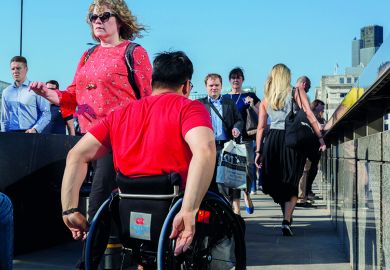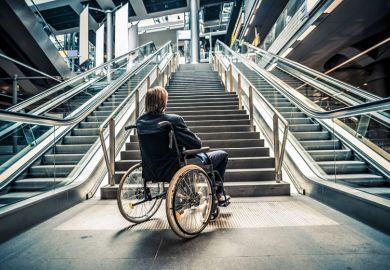Living with a disability should never be a barrier to entering higher education. Since becoming the UK’s universities minister, I have made it a personal priority to ensure our higher education system is working for disabled students. I am keen that students with a disability get the support they need to have a fulfilling student experience and obtain the outcomes that their talents and potential deserve.
Today, a record number of students with a disability are going to university in England, reaching just under 250,000 in 2017/18. Their ability to access and participate successfully in university life has been helped by Disabled Students’ Allowances (DSAs), which help with any extra study costs that they incur as a result of their disability. Research by the Department for Education shows us that more than two-thirds of students with a disability now feel confident about completing their course (69 per cent) and passing it (68 per cent).
But this confidence shouldn’t stop at undergraduate level. As reinforced by our Industrial Strategy, the UK needs talented people to go on to further study, to perform world-leading research and fuel our fast-growing industries. That’s why I’m proud to have overseen the increase in maximum amount of DSA funding that postgraduates can apply for, raising it to £20,000 from 2019/20.
Increasing financial support for disabled students is, however, just one part of the solution. The other is working with higher education providers to ensure that they are putting the needs of disabled students front and centre in their planning.
I know from my visits to almost 40 UK universities that many institutions are working hard to get it right. On a visit to Brunel University in January, I saw first-hand how the university has adapted its student accommodation to ensure disabled students can live in comfort and get the most out of their university experience.
From speaking to students elsewhere in the country, I nevertheless know that not all this support is offered seamlessly throughout institutions, and that it can still be all too easy for disabled students to fall through the cracks.
On a recent visit to the University of Birmingham’s Vision Impairment Centre for Teaching and Research, I met blind and partially sighted students from different English universities who told me openly how they have sometimes been let down by the system. A poignant example that has stuck with me comes from a student who, despite receiving study support, was let down in the examination hall when their university failed to provide them with a question paper in the required large print format. For the student, this could have been the difference between a pass or fail.
When things like this go wrong, it is the students who suffer. And it is not right that poor communication and a lack of join-up within institutions could imperil students’ chances of success.
This week, the Prime Minister launched a package of measures to tackle barriers such as these faced by disabled people so that they can fully participate in society. And I’m pleased today to be supporting the inclusion of disabled students in higher education through the new Disabled Students Commission.
The Commission, supported and developed by the Office for Students, has been established to look at what more needs to be done to support disabled students throughout the student journey. I want to see it identify and promote good practice in the sector, and I’ll be looking forward to seeing it engage fruitfully with the students who really matter.
As universities minister, I want all students irrespective of background and circumstance to feel able to go to any institution they desire. Nobody should feel their options are narrowed just because the environment and procedures may make it difficult for them to do so.
Our universities should be welcoming environments for everyone. And I firmly believe that if we get it right for disabled students then we get it right for all students.
Chris Skidmore is the UK’s minister for universities, science, research and innovation.
Register to continue
Why register?
- Registration is free and only takes a moment
- Once registered, you can read 3 articles a month
- Sign up for our newsletter
Subscribe
Or subscribe for unlimited access to:
- Unlimited access to news, views, insights & reviews
- Digital editions
- Digital access to THE’s university and college rankings analysis
Already registered or a current subscriber?








